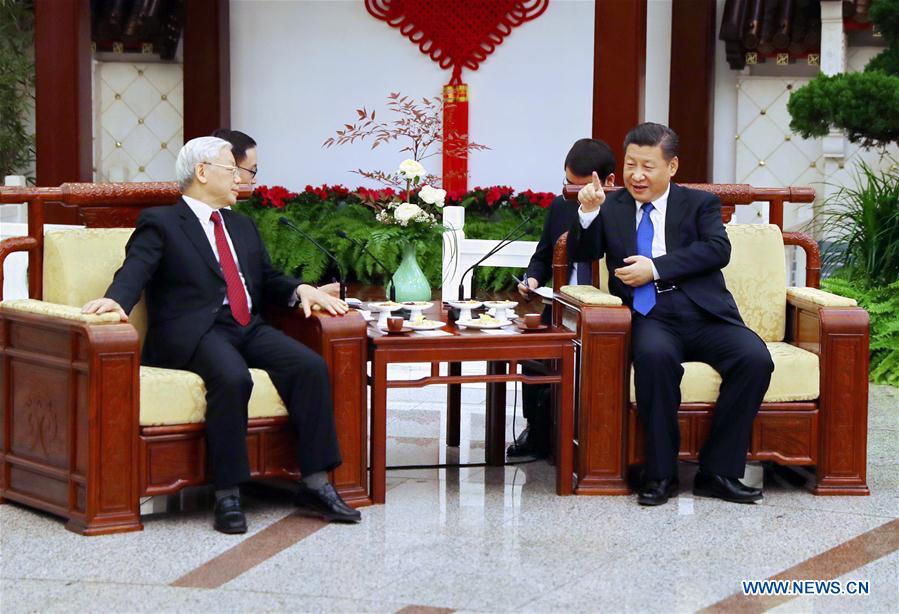BEIJING, Jan. 13 (Xinhua) -- China and Vietnam are looking forward to a promising future in relations as a high-ranking Vietnamese delegation visits Beijing at the beginning of a new year.

Chinese President Xi Jinping (R), who is also General Secretary of the Communist Party of China Central Committee, and Nguyen Phu Trong, General Secretary of the Communist Party of Vietnam Central Committee, have a tea chat after their talks in Beijing, capital of China, Jan. 12, 2017. (Xinhua/Ju Peng)
Nguyen Phu Trong, General Secretary of the Communist Party of Vietnam (CPV) Central Committee, led the delegation and chose China as his first foreign destination this year.
The Vietnamese delegation includes the four Politburo members in charge of communication and education, foreign affairs, national defense and public security, reported the state-run news agency VNA, signaling the great importance Hanoi has attached to Trong's first China visit after being re-elected as Party chief in January 2016.
Trong was received by Chinese President and General Secretary of the Communist Party of China (CPC) Central Committee Xi Jinping, and members of the Standing Committee of the Political Bureau of the CPC Central Committee.
Trong's visit comes as China-Vietnam ties are stable with progress in various fields, including maritime cooperation.
In recent years, China and Vietnam have jointly patrolled and explored for oil in the Beibu Gulf, demarcation of which set an example for the handling of South China Sea disputes.
Success stories demonstrate that both countries are committed to shelving their maritime differences through cooperation rather than confrontation, which will yield more win-win results and larger-scale cooperation.
The Vietnamese side hopes to deepen strategic communication and political trust with China, Trong said on Thursday in Beijing, stressing it is the top priority of Vietnam's foreign policy to enhance all-round strategic cooperation with China.
"Vietnam and China enjoy comradely and brotherly friendship." The remark of late Vietnamese leader Ho Chi Minh in the 1950s has been repeatedly quoted during high level interactions.
Though the two countries' diplomatic relations have not been all plain sailing since they were established in early 1950, it is unsurprising to see their traditional friendship increasingly consolidated.
A stable and closer China-Vietnam relationship lies not just in their proximity -- the two share a border stretching 1,450 kilometers -- but few countries have as much in common as China and Vietnam. With similar political systems, they are both communist Party-led socialist states, intertwined in advancing the cause of socialism.
The two economies are closely linked. China is the largest trading partner of Vietnam, which in turn is China's second largest trade partner in the Association of Southeast Asian Nations (ASEAN).
After 30 years of Doi Moi (renewal), Vietnam still faces challenges in terms of infrastructure development. This area, along with investment and trade, is expected to be expanded through aligning its "Two Corridors and One Economic Circle" with China's Belt and Road Initiative.
In 2017, Vietnam will host the Asia-Pacific Economic Cooperation (APEC) meetings. China has promised its support and the two sides are expected to jointly promote globalization against protectionism and facilitate negotiations on the Regional Comprehensive Economic Partnership (RCEP).
China and Vietnam, two of the six countries along the Lancang-Mekong River, can benefit from the Lancang-Mekong Cooperation mechanism focusing on security and development, as well as political, social and cultural fields.
Shared water, shared future. As the saying goes in China, "when water comes, a channel is formed," which means when conditions are ripe, success is achieved. It is hoped the two countries can push their bilateral relations toward a shared future.















